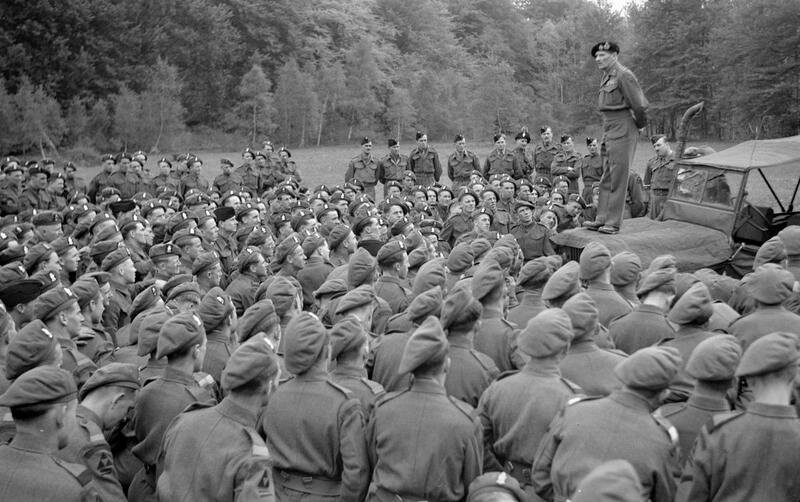5 June 1944, Allied High Command, Southern UK
The time has come to deal the enemy a terrific blow in Western Europe.
The blow will be struck by the combined sea, land and air forces of the Allies together constituting one great Allied team, under the supreme command of General Eisenhower
On the eve of this great adventure, I send my best wishes to ever soldier in the Allied team. To us is given the honour of striking a blow for freedom, which will live in history. And in the bitter days that lie ahead, men will speak with pride of our doings. WE have a great and a righteous cause.
Let us pray that "The Lord Mighty in Battle " will go forth with our armies, and that His special providence will aid us in the struggle.
I want every soldier to know that I have complete confidence in the successful outcome of the operations that we are now about to begin.
With stout hearts, and with enthusiasm for the contest, let us go forward to victory.
And, as we enter the battle, let us recall the words of a famous soldier spoken many years ago :
"He either fears his fate too much,
Or his deserts are small,
Who dare not put it to the touch,
To win or lose it all. "
Good luck to each one of you. And good hunting on the mainland of Europe.
…
In the weeks approaching D-Day, General Montgomery also went on a speaking tour of the Briritsh Isles, inspecting and addressing troops. His goal was to speak to, and motivate as many soldiers as possible in this crucial pre D-Day period. Here is an account from journalist Alan Moorehead:
And then Montgomery’s speech would go like this: ‘I wanted to come here today so that we could get to know one another: so that I could have a look at you and you could have a look at me – if you think that’s worth doing.
We have got to go off and do a job together very soon now, you and I, and we must have confidence in one another. And now that I have seen you I have complete confidence… complete confidence… absolutely complete confidence. And you must have confidence in me.’
That was the beginning. For a hundred yards all round him row after row of young upturned faces, an atmosphere of adolescent innocence and simplicity. They sat on the grass keeping utterly still lest they should lose a word.
…
‘We have been fighting the Germans a long time now,’ Montgomery went on. ‘A very long time… a good deal too long. I expect like me you are beginning to get a bit tired of it… beginning to feel it’s about time we finished the thing off.
And we can do it. We can do it. No doubt about that. No doubt about that whatever. The well-trained British soldier will beat the German every time. We saw it in Africa. We chased him into the sea in Tunisia… then we went over to Sicily and chased him into the sea again… I don’t know if there are any more seas…’
This was the point where the soldiers relaxed and laughed. Well, it was true, wasn’t it? The Germans had been beaten in Africa. They weren’t so wonderful.
‘The newspapers keep calling it the Second Front,’ Montgomery continued. ‘I don’t know why they call it the Second Front. I myself have been fighting the Germans on a nunber of fronts, and I expect a good few of you have too.
They should call it Front Number Six or Front Number Seven. As long as they don’t want us to fight on Front Number Thirteen…’
Most of the tenseness had gone out of the soldiers now. Monty was all right. He didn’t talk a lot of cock about courage and liberty. He knew what it was like. And perhaps one had been taking the whole thing a bit too seriously. It wouldn’t be so bad.
Then – ‘We don’t want to forget the German is a good soldier… a very good soldier indeed. But when I look around this morning and see the magnificent soldiers here… some of the best soldiers I have seen in my lifetime… I have no doubt in my mind about the outcome… no doubt whatever. No doubt at all that you and I will see this thing through, together.’
Finally – ‘Now I can’t stay any longer. I expect some of you have come a long way to get here this morning and you want to get back.’ (Some of them had been travelling since 4 am.) ‘I just want to say good-bye and very good luck to each one of you.’
That was the speech, followed by three cheers for the general. I listened to it four and sometimes five times a day for nearly a week. We went from camp to camp over southern England, sometimes standing on wet hill-tops, sometimes surrounded by civilians in city parks, sometimes on a football field or under the shelter of a wood.
Always the same rush to the jeep, the same tense attention. It fascinated me every time. Long after one knew the words by heart and had ceased to listen to them one was swept into the contagious and breathless interest of each new audience.
I suppose I have heard fifty generals addressing their soldiers, most of them with much better speeches than this. Indeed I suppose this speech in print is just about as bad as one could hope to read, outside the hearty naiveté of the kindergarten. Spoken by Montgomery to the soldiers who were about to run into the Atlantic Wall it had magic.

